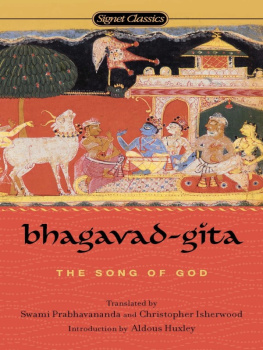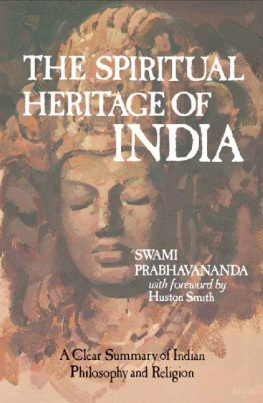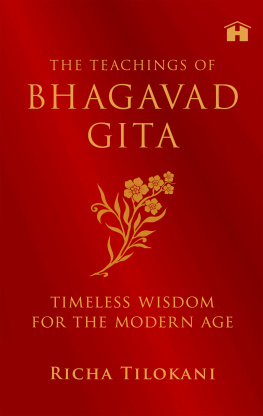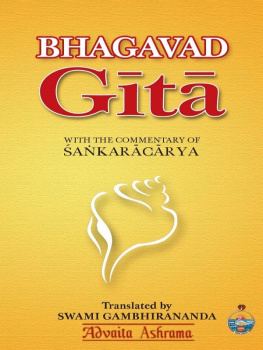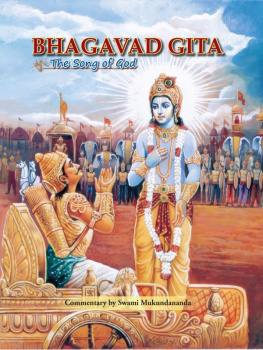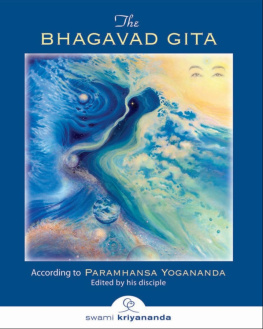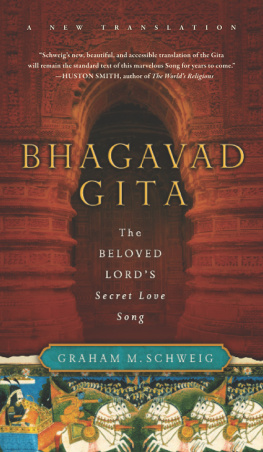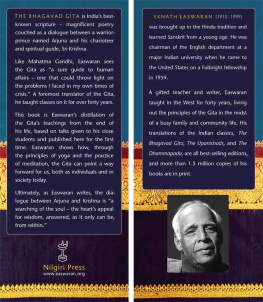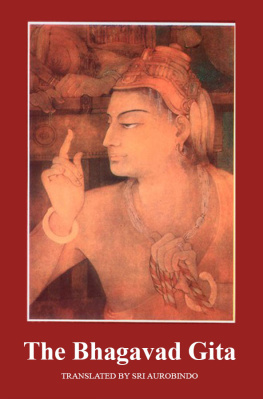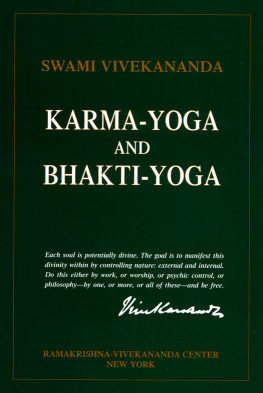Table of Contents
Copyright 1944, by Swami Prabhavananda
All rights reserved. This book or parts thereof must not be reproduced in any form without permission.
THIRD PRINTING
Manufactured in United States of America
Kessinger Publishings Rare Reprints Thousands of Scarce and Hard-to-Find Books!
Americana
Ancient Mysteries
Animals
Anthropology
Architecture
Arts
Astrology
Bibliographies
Biographies & Memoirs
Body, Mind & Spirit
Business & Investing
Children & Young Adult
Collectibles
Comparative Religions
Crafts & Hobbies
Earth Sciences
Education
Ephemera
Fiction
Folklore
Geography
Health & Diet
History
Hobbies & Leisure
Humor
Illustrated Books
Language & Culture
Law
Life Sciences
Literature
Medicine & Pharmacy
Metaphysical
Music
Mystery & Crime
Mythology
Natural History
Outdoor & Nature
Philosophy
Poetry
Political Science
Science
Psychiatry & Psychology
Reference
Religion & Spiritualism
Rhetoric
Sacred Books
Science Fiction
Science & Technology
Self-Help
Social Sciences
Symbolism
Theatre & Drama
Theology
Travel & Explorations
War & Military
Women
Yoga
We kindly invite you to view our extensive catalog list at:
http://www.kessinger.net
To
the memory of
SWAMI TURIYANANDA
who was regarded by his master
SRI RAMAKRISHNA
as a perfect embodiment of that
renunciation
which is taught in the
BHAGAVAD GITA
TRANSLATORS PREFACE
Nowadays, it is becoming fashionable to translate the worlds great books into some form of Basic English, or everyday speech. The Gita does not easily lend itself to such treatment. The Sanskrit in which it is written differs radically from modern English. It is compressed and telegraphic. It abounds in exact philosophical and religious terms. Its frame of reference is a system of cosmology unfamiliar to western thought. And indeed, it would be hard to evolve any uniform English style, modern or ancient, in which the Gita could be satisfactorily rendered. For the Gita, regarded simply as a piece of literature, is not a unity. It has several aspects, several distinct tones of voice. Let us consider each of them in turn.
First, the Gita may be regarded as part of an epic poem. It is all in verse. The first chapter is pure epic, continuing in the mood of the Mahabharata itself. The shouting of warriors, the neighing of horses and the outlandish names of chieftains are still sounding in our ears as the dialogue between Krishna and Arjuna begins. To translate this epic prologue as though it belonged to the philosophical discourse which follows would be to cut the Gita right out of its historical setting and deprive it of its vivid local color.
Then, again, the Gita is an exposition of Vedanta philosophy, based upon a very definite picture of the universe. It is no use trying to disregard this fact, for fear of alienating the western reader. The translator who uses reassuring topical equivalents, and twists the meaning of the Sanskrit terms, may think he is building a bridge between two systems of thought, when actually he is reducing both of them to nonsense. We have tried to explain the cosmology of the Gita, as briefly as possible, in an appendix. Certain basic and much-used words, such as Brahman, Atman, Prakriti and the gunas, have been kept in Sanskrit, for the same reason. Precise English equivalents are lacking; and every book on philosophy or science must have a defined terminology. No one would write about physics and avoid using the word electron, just because it does not occur in everyday speech.
The Gita is also prophetic. Like the Vision of Isaiah and the Psalms of David, it contains ecstatic mystical utterances about the nature and attributes of God. These are poetry, and demand poetic expression. The diction must try to correspond to the inspiration. Ordinary prose will render them flat and boring.
Finally, the Gita is a gospel. Its essential message is timeless. In words which belong to no one language, race or epoch, incarnate God speaks to man, His friend. Here, the translator must forget all about Vedanta philosophy and Sanskrit terms; all about India and the West, Krishna and Arjuna, past and future. He must aim at the utmost simplicity.
That is why we have translated the Gita in a variety of styles, partly prose, partly verse. There is, of course, no justification for this experiment in the text itself. The transitions from one style to another are quite arbitrary. They can be judged from one standpoint only: have we made the book more readable?
Extremely literal translations of the Gita already exist. We have aimed, rather, at an interpretation. Here is one of the greatest religious documents of the world: let us not approach it too pedantically, as an archaic text which must be jealously preserved by university professors. It has something to say, urgently, to every one of us. We have to extract that message from the terseness of the original Sanskrit, and here the great classical commentators can help us. In making this translation, three of them have been consulted throughoutShankara, Sridhar Swami and Madhusudan Saraswati. Wishing to avoid bulky footnotes, we have incorporated their explanations in our English version. Sri Aurobindo Ghoses masterly Essays on the Gita have also been helpful. Nevertheless, our work is not a paraphrase. Except in a very few difficult passages, it faithfully follows the original.
We have allowed ourselves one small liberty. The Gita is sprinkled with epithets. Krishna is called Govinda, Slayer of Madhu, Keshava, etc. Arjuna is addressed as Consumer of the foe, Son of Kunti, Descendant of Bharata, Son of Pritha, and much else. We have kept a few of these, in the opening chapters, to create atmosphere. Later, they are mostly omitted, unless they seem effective for purely literary reasons. Their repetition is apt to grow very tiresome.
In conclusion. we have to thank our friends, Margaret Adams Kiskadden and Aldous Huxley, for their help, frank criticism and warm encouragement. The final draft of our translation owes them much, perhaps its very existence.
INTRODUCTION
More than twenty-five centuries have passed since that which has been called the Perennial Philosophy was first committed to writing; and in the course of those centuries it has found expression. now partial, now complete, now in this form, now in that, again and again. In Vedanta and Hebrew prophecy, in the Tao Teh King and the Platonic dialogues, in the Gospel according to St, John and Mahayana theology, in Plotinus and the Areopagite, among the Persian Sufis and the Christian mystics of the Middle Ages and the Renaissancethe Perennial Philosophy has spoken almost all the languages of Asia and Europe and has made use of the terminology and traditions of every one of the higher religions. But under all this confusion of tongues and myths, of local histories and particularist doctrines, there remains a Highest Common Factor, which is the Perennial Philosophy in what may be called its chemically pure state. This final purity can never, of course, be expressed by any verbal statement of the philosophy, however undogmatic that statement may be, however deliberately syncretistic. The very fact that it is set down at a certain time by a certain writer, using this or that language, automatically imposes a certain sociological and personal bias on the doctrines so formulated. It is only in the act of contemplation, when words and even personality are transcended, that the pure state of the Perennial Philosophy can actually be known. The records left by those who have known it in this way make it abundantly clear that all of them, whether Hindu, Buddhist, Hebrew, Taoist, Christian or Mohammedan, were attempting to describe the same essentially indescribable Fact.

